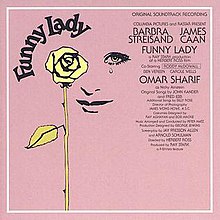
Funny Lady is a 1975 American biographical musical comedy-drama film and the sequel to the 1968 film Funny Girl. The film stars Barbra Streisand, James Caan, Omar Sharif, Roddy McDowall and Ben Vereen.

"People" is a song composed by Jule Styne with lyrics by Bob Merrill for the 1964 Broadway musical Funny Girl starring Barbra Streisand, who introduced the song. The song was released as a single in 1964 with "I Am Woman", a solo version of "You Are Woman, I Am Man", also from Funny Girl.

"The Way We Were" is a song by American singer Barbra Streisand from her fifteenth studio album of the same name. It was released as the album's lead single on September 27, 1973, through Columbia Records. The 7" single was distributed in two different formats, with the standard edition featuring B-side track "What Are You Doing the Rest of Your Life?"; the Mexico release instead included an instrumental B-side. The song was written by Alan Bergman, Marilyn Bergman, and Marvin Hamlisch, while production was solely handled by Marty Paich. "The Way We Were" was specifically produced for the record, in addition to three other tracks, including her then-upcoming single "All in Love Is Fair" (1974).
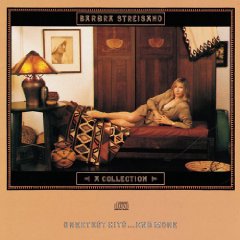
A Collection: Greatest Hits...and More is the third greatest hits album recorded by American vocalist Barbra Streisand. It was released on October 3, 1989 by Columbia Records. The compilation features ten songs from Streisand's career, dating from 1975 to 1988, plus two previously unreleased songs: "We're Not Makin' Love Anymore" was released as the album's lead single on September 14, 1989, and "Someone That I Used to Love" was distributed as the second and final one in 1989. Both singles charted on several record charts internationally.

"Shake Me, Wake Me " is a song recorded by the American quartet Four Tops for their third studio album, On Top (1966). It was released in February 1966 as a 7" vinyl single through Motown records. It was written and produced by Brian Holland, Lamont Dozier, and Eddie Holland. A gospel rock track, its lyrics detail a relationship that has ended. It has since been regarded as one of Four Tops' most successful singles ever. It charted moderately well in both the United States and Canada, and became the group's fifth consecutive entry to chart within the top five of the Hot R&B/Hip-Hop Songs chart. Four Tops has performed "Shake Me, Wake Me " on various occasions throughout their careers and have included it on several greatest hits albums, including on The Four Tops Greatest Hits (1967) and The Ultimate Collection (1997).
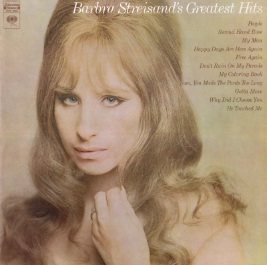
Barbra Streisand's Greatest Hits is the first greatest hits album recorded by American vocalist Barbra Streisand. It was released on January 1, 1970, by Columbia Records. The record is a compilation consisting of 11 commercially successful singles from the singer's releases in the 1960s, with a majority of them being cover songs. The songs on Barbra Streisand's Greatest Hits originally appeared on one of the singer's eight previous albums and span in release from 1963 to 1968. It contains her most commercially successful tracks, including her first Billboard Hot 100 top ten single "People" and top 40 entry "Second Hand Rose". The album was distributed on compact disc in 1986 and rereleased under the title The Hits in 2006.
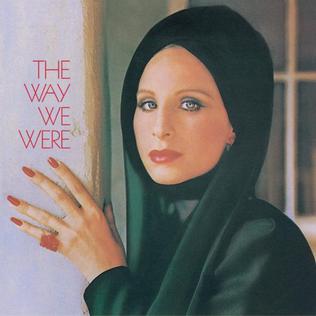
The Way We Were is the fifteenth studio album recorded by American singer Barbra Streisand. Following the commercial success of its lead single "The Way We Were", the album was released in January 1974. Three additional songs were newly recorded for the album, while six of the tracks salvaged material from previously unreleased Streisand projects. Following the distribution of a soundtrack album for the 1973 film of the same title, Columbia added a caption to Streisand's LP in order to minimize confusion between the two albums.

Barbra Streisand's Greatest Hits Volume 2 is the second greatest hits album recorded by American vocalist Barbra Streisand. It was released on November 15, 1978 by Columbia Records. The album is a compilation consisting of ten commercially successful singles from the singer's releases in the 1970s, with a majority of them being cover songs. It also features a new version of "You Don't Bring Me Flowers", which was released as the collection's only single on October 7, 1978. Originating on Streisand's previous album, Songbird, the new rendition is a duet with Neil Diamond who had also recorded the song for his 1978 album of the same name. The idea for the duet originated from DJ Gary Guthrie who sold the idea to the record label for $5 million.

Lazy Afternoon is the seventeenth studio album recorded by American singer Barbra Streisand. It was released on October 14, 1975 by Columbia Records. Following a mixed critical response to her previous studio album, ButterFly (1974), the singer began working with new musicians for the project. Recorded in April 1975 in Los Angeles, Lazy Afternoon contains pop standards. Producer Rupert Holmes wrote three songs on the album, and co-wrote a fourth, "By the Way", with Streisand. She also included a few cover songs, such as Four Tops' "Shake Me, Wake Me ", Stevie Wonder's "You and I", and Libby Holman's "Moanin' Low".
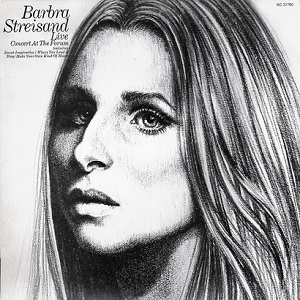
Live Concert at the Forum is the second live album by American singer Barbra Streisand, released physically on October 1, 1972 by Columbia Records. Produced by long-time collaborator Richard Perry, it was recorded at The Forum in Inglewood, part of Greater Los Angeles, on April 15, 1972, during Four for McGovern, a concert held in benefit for George McGovern's 1972 presidential campaign. A CD version of Live Concert at the Forum was released on September 6, 1989.

ButterFly is the sixteenth studio album by American singer Barbra Streisand. Released on October 1, 1974, by Columbia Records, it marked Streisand's first album of entirely new material in over three years. Primarily a contemporary pop record recorded throughout 1974, it also incorporates music from the reggae and R&B genres. All of the tracks on ButterFly are cover songs produced by Streisand's then-boyfriend Jon Peters, originating from artists like Bob Marley, David Bowie, Evie Sands, and Graham Nash.

Barbra Streisand...and Other Musical Instruments is the fourteenth studio album by American singer Barbra Streisand. It was released on November 2, 1973 by Columbia Records. The album was made available following a 1973 live television special promoted to improve Streisand's image and sound. With world music as the primary genre, the album's instrumentation varies greatly; even items such as kitchen utensils were used to create melodies and beats. With a majority of the songs on the album being cover songs, Streisand also re-recorded various tracks that originated earlier in her career. Her manager, Martin Erlichman, was credited as the album's sole and executive producer.

The Owl and the Pussycat is the soundtrack album to the 1970 American film of the same name. It was released by Columbia Records on December 19, 1970 and features dialogue from the film by Barbra Streisand and George Segal recorded over music performed by American band Blood, Sweat & Tears. The album's five tracks were all written by Buck Henry, produced by Thomas Z. Shepard, and later released by Blood, Sweat & Tears in stripped down instrumental versions on their 2013 compilation album Rare, Rarer & Rarest. An 8-track cartridge edition and cassette tape edition of The Owl and the Pussycat was also distributed, featuring four songs instead of five.

"Didn't We" is a song recorded by Irish singer and actor Richard Harris for his debut studio album, A Tramp Shining (1968). It was written and produced by Jimmy Webb and originally served as the B-side to Harris' 1968 single "MacArthur Park". "Didn't We" was then distributed as the record's single by Dunhill Records, also in 1968. A traditional pop song, Harris sings about his life in the past. Commercially, it charted at lower positions of both the United States and Canada, and in the higher ranks of their Adult Contemporary component charts. Harris featured "Didn't We" on several of his greatest hits albums, including The Richard Harris Collection: His Greatest Performances from 1973. That same year, the song was reissued as a promotional single paired alongside his 1971 single "My Boy".

On a Clear Day You Can See Forever is the soundtrack album to the 1970 American film of the same name. It was released by Columbia Records on July 1, 1970 and features singing by Barbra Streisand and Yves Montand, in addition to choral arrangements and live orchestration. No commercial singles were released from the soundtrack, but the reprise version of the title track was released as a promotional single on 7" vinyl by Columbia. Executively and solely produced by Wally Gold, the album's ten tracks were written by Alan Jay Lerner while the music was written by Burton Lane. The album was reissued on compact disc in 2008.

"All in Love Is Fair" is a song by American singer-songwriter Stevie Wonder recorded for his sixteenth studio album, Innervisions (1973). Written and produced by Wonder, it was released as a 7" single in Brazil in 1974. The song is a pop ballad with lyrics that describe the end of a relationship through the use of clichés. Critical reaction to the song was varied: Matthew Greenwald of AllMusic wrote that it was among Wonder's "finest ballad statements", but Robert Christgau felt that the singer's performance was "immature". Wonder has included it on several of his greatest hits albums, including the most recent, 2005's The Complete Stevie Wonder.

"Jubilation" is a song recorded by Canadian singer-songwriter Paul Anka for his 1972 studio album of the same name. Anka wrote the song with Johnny Harris, who also produced the track. It was released in 1972 as a 7" single by Buddah Records. A gospel song, the lyrics of "Jubilation" find the protagonist preaching about religious themes. Making a moderate commercial impact, it appeared on the record charts in both Canada and the United States. It has since been included on several of Anka's greatest hits albums and covered by The Edwin Hawkins Singers in 1973.
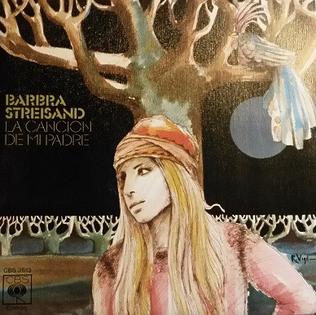
"My Father's Song" is a song recorded by American singer Barbra Streisand for her seventeenth studio album, Lazy Afternoon (1975). It was released as a 7" single in August 1975 through Columbia Records. Rupert Holmes wrote the song in collaboration with its producer Jeffrey Lesser. A sentimental ballad, "My Father's Song" was about Streisand's childhood with her father; Holmes' lyrics involve a protagonist, presumably a daughter, asking for her father's approval in life and love.

"How Lucky Can You Get" is a song recorded by American vocalist Barbra Streisand for the official soundtrack to the 1975 film Funny Lady. It was released as a 7" single in April 1975 through Arista Records. The song was written by Fred Ebb and John Kander, while production was handled by Peter Matz. "How Lucky Can You Get" is one of the new songs on the soundtrack, with its origins coming from Fanny Brice, the character Streisand portrays in the aforementioned film. The music pertains to Brice herself, particularly the sarcastic nature of the lyrics that are accompanied by an "insistent" melody and production. It was suggested that the pattern of the lyrics may have been influenced by Giacomo Puccini's 1896 opera, La bohème.

The Way We Were: Original Soundtrack Recording is the soundtrack album to the film of the same title by American singer Barbra Streisand. It was released by Columbia Records on January 1, 1974. The soundtrack comprises twelve songs, mostly written by Marvin Hamlisch, three of which are different versions of "The Way We Were". The album was mostly produced by Fred Salem, with the exception of the title track which was produced by Marty Paich. Hamlisch and Salem collaborated to create five new songs for the soundtrack, while the remaining ones are cover songs.
